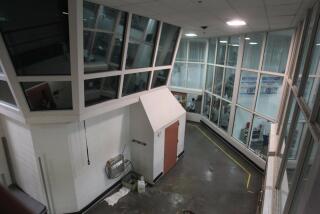Report Assails Hospital Lapses
- Share via
Nurses at Martin Luther King Jr./Drew Medical Center were ordered to lie about patients’ conditions, failed to give crucial medications prescribed by doctors and left seriously ill patients unattended for hours -- including three who died -- according to a new report by federal health officials.
Government inspectors have now identified five patients who died at King/Drew last year after what were determined to have been grave errors by staff members, and the findings could trigger criminal investigations into possible misconduct by the nurses and their supervisors.
The Jan. 13 report also said hospital officials had failed to fix dangerous lapses in care after promising to do so.
Details in the report suggest that problems at the Los Angeles County-owned hospital in Willowbrook, just south of Watts, are far worse than previously disclosed and that the county faces a daunting task in turning it around.
For instance, inspectors found that nurses had all but ignored 20-year-old Oluchi McDonald, who was suffering from gangrene of the intestines, when he arrived by ambulance March 12. Eighteen hours later, he was found on the floor -- where he had fallen unnoticed -- in a pool of his own vomit, according to the federal report and an autopsy summary. He could not be revived.
“It’s extremely distressing to know that he was rendered invisible,” said his mother, Akilah Oliver, a college lecturer in Boulder, Colo., “that his life seemed not to be important to his caretakers.”
Four days after McDonald died, another patient suffering from gangrene and other problems died. He was neglected for almost a day, the report said.
Then, in July, two women died when nurses did not notice their conditions were deteriorating, even though they were connected to cardiac monitors, government inspectors found. In December, a fifth patient died under similar circumstances in the same unit, known as 4B, the report said.
Taken together, the deaths and other shortfalls in patient care illustrate the “failure of the hospital to ensure quality health care in a safe environment,” said the report by the U.S. Centers for Medicare and Medicaid Services, which oversees federal healthcare funding. The document has not yet been released publicly but was obtained by The Times.
A federal health official familiar with King/Drew, who declined to be identified, said the problems found and the number of questionable deaths were highly unusual.
Nurses told inspectors, for instance, that their supervisors had ordered them to downplay the conditions of critically ill patients to subvert rules requiring that the sickest patients get more nursing care.
In response, officials suspended assistant nursing director Margaret Latham without pay last Friday and had her escorted from the hospital. She could not be reached for comment Thursday.
The county had already suspended the hospital’s nursing director without pay and hired an outside firm to run the nursing operation.
“It’s criminal,” said Supervisor Zev Yaroslavsky, one of five county supervisors responsible for overseeing the hospital, referring to nurses’ alleged misconduct. “It’s just unbelievable. It’s unethical. It’s immoral and it’s probably illegal.”
Officials in the county Department of Health Services said they were preparing cases to be presented to the district attorney’s office for possible criminal prosecution. These include “intentional misrepresentation of patient conditions,” said Fred Leaf, the agency’s chief operating officer.
Leaf said that the department was investigating 20 to 25 cases of misconduct at the hospital and that he expected to discipline employees in coming weeks.
In recent weeks he has spent much of his time at King /Drew, which was founded to provide desperately needed services to South Los Angeles after the 1965 Watts riots and remains one of the few healthcare providers in the area.
If the problems are not corrected, the hospital could lose all federal funding, which accounts for about half its $430-million annual budget. Such a move would be rare, however, and county officials say they are making reforms to avoid that.
“I think you will find that, once they see what we’ve done, they will be amazed at the extent to which we have taken immediate and decisive action,” said Dr. Thomas Garthwaite, director of the county health department.
He cited changes that include closing unit 4B, where at least three of the patients died, and bringing in new managers.
The Jan. 13 report is the latest and most damning in a series of sanctions and citations issued against the hospital since August.
A national accrediting group has revoked King/Drew’s ability to train aspiring surgeons and radiologists and has threatened to do the same for trainees in neonatology.
This latest round of inspections was spurred by the deaths last summer of the two women in 4B. Both were supposed to be continuously watched by nurses but were not. State inspectors were so concerned by the events that they asked the federal government to authorize a more extensive review.
During that review, which began in December, inspectors pulled the files of 20 patients and found that eight of them had received inadequate care.
In three of those cases, the patients died.
Inspectors also found serious and unusual ethical breaches that deprived the most critically ill patients of adequate care.
“Confidential interviews revealed that nursing staff were prohibited from assigning patients a classification of IV,” the most critical level of sickness, the report said.
Delays Found
As a result, inspectors said, nurses sometimes struggled to care for four times as many patients as the state allowed. Crucial medications and treatments were often delayed for hours. Nurses also did little to help patients who were in severe pain, according to the findings.
On one shift reviewed by inspectors, nine of the 16 patients should have been classified at the sickest level, which would have required one nurse for every two patients.
One patient was bleeding and required multiple transfusions, five required ventilators to aid their breathing and one of those patients had a temperature as high as 104 degrees, inspectors found. Four more patients were waiting to be admitted from the emergency room.
Yet there were only two registered nurses assigned to the unit -- one for every eight patients, according to the report. One less skilled licensed vocational nurse, though not qualified for the task, was left to watch the cardiac monitors. When nursing administrators were asked for help, they told the nurses on duty that no help was available, the report said.
The inspectors also found that the hospital hadn’t followed through on pledges to correct problems.
For instance, in November, state health inspectors looking into the two women’s deaths in 4B issued a report that cited errors, misconduct, and poor training of nurses. The county promised better training and oversight.
But the death of the man in December under similar conditions showed that those changes were not made, according to federal inspectors.
In fact, the man’s family had to tell nurses that something was wrong with him. When nurses went to his room, they found a “flat line” on the cardiac monitor and no heart rate, the report said. He died within hours.
The employee assigned to watch the monitors “had not notified the nurse prior to being alerted by the patient’s family” that the man’s heart had stopped, according to the report. The Times reported this patient’s death last month.
Even after this death, the hospital still did not ensure that employees in 4B were trained to use the monitors or were even paying attention, inspectors found.
When inspectors visited King/Drew on Dec. 23, the nurse assigned to watch the cardiac monitors told them she “did not feel comfortable” with use of the devices. Her employee file also lacked proof that she had been trained to operate them or spot abnormal heart rhythms, the report said.
While inspectors spoke to the nurse, the monitors for all six patients in 4B showed a red X next to the “pulse” read-out.
None of the three nurses in 4B at the time knew the X meant that the alarm, designed to alert them to dangerous dips in patients’ heart rates, was off.
While the inspectors were at King/Drew, county officials were in the process of closing 4B until they could ensure that the staff was properly trained.
Last March, in the second of the deaths, the patient arrived at the emergency room with gangrene of his lower leg, pneumonia with a collapsed lung and kidney failure.
Although his temperature was 90.8 degrees, there was no evidence that the nurse gave him a heating blanket, inspectors found. Nor was there any sign that he received the antibiotics or blood products ordered by the doctor to control his infection and blood-clotting problems during the 22 1/2 hours he was in the emergency room, the report said. The man died a short time after being transferred to an inpatient bed, according to inspectors.
‘Horrifying’ Conditions
Supervisor Gloria Molina said county officials were working as quickly as possible to reverse the “horrifying” conditions at King/Drew.
“We recognize there are huge problems there -- huge, huge problems,” she said. “They must be resolved, and we need to take some very drastic actions, and those are the actions we’re taking today.”
Supervisor Yvonne Brathwaite Burke, whose district includes the hospital, said she felt terrible about how the patients died. Given the details of 20-year-old McDonald’s death, she said, “It’s something that should not happen.”
Yaroslavsky said he was particularly troubled that some of the patient care lapses had occurred after county officials took over the day-to-day running of the hospital.
“It was more than a little bit disconcerting that problems were still popping up after all this had been known to us,” he said. “And it begs the question: What is going on there today?”
More to Read
Sign up for Essential California
The most important California stories and recommendations in your inbox every morning.
You may occasionally receive promotional content from the Los Angeles Times.










